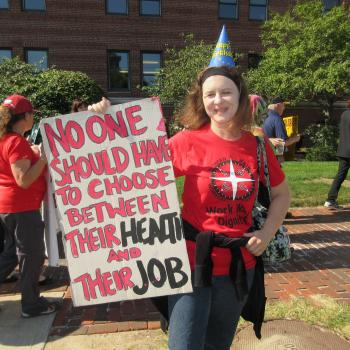Read rightly, Anselm’s account of the atonement is finally not economic. It is not a matter of debt, of juridical equity and restitution, of compensatory loss or penal suffering. As Anselm says, in accord with standard precepts of medieval theology, God needs nothing and no necessity compels God to act as God does in redeeming us from sin. Likewise, God does not demand bloodshed, divine justice is not in conflict with divine mercy, and God’s power and dignity cannot be diminished by human insurrection. That Anselm continues to be read in terms of this economic logic (debt, equity, retribution) and these distinctions (justice versus forgiveness) reflects less the deficiencies of his Augustinian vision of sacrifice than it does the way we modern readers of Anselm have been disciplined by an economy that functions in accordance with such logic and such distinctions.
Shorn of such economic distortions, Anselm’s account of the atonement reveals the splendor of the aneconomic bounty of God’s goodness. God became human not to satisfy an infinite debt, but so that humanity might be restored to the place of honor that God intended for humanity, namely, participation in the divine life. The injury to God’s honor that is effected by sin is a matter of the absence of humanity from the full communion with its creator. Thus, rightly understood, God’s honor is not a barrier to humanity’s reconciliation with God, one that creates an infinite debt: rather it is the origin of God’s free act to provide humanity with a path to renewed communion. The atonement, the judgment of God, is not about a juristic reckoning stretched to infinity, but ontological union.
As such it displays not the scarcity of finitude in the face of the infinite but the plenitude of divine charity, of God’s giving and giving again. God has always given to humanity in the form of love, and when humanity rejected that gift, God gave again in the form of love incarnate, which is the Son. Christ’s work is that of giving again, of communicating God’s love and grace (which has never ceased to flow) to humanity again (and again). The work of atonement is God in Christ bearing human rejection and extending the offer of grace again, thereby opening a path for humanity to recover beatitude. In this sense, Christ’s faithfulness even to the point of death on the cross marks not a divine demand for retribution, not the settling of a debt, but a divine refusal to hold our rebellion against us…
The atonement is not about infinite debt and totalized judgment, but about the instantiation of the gift that enables us to return to our source. It is about humanity’s being taken up into the divine life of the Trinity through participation in Christ. There is a sacrifice involved in this atoning work, and there is a substitution. But these are not positioned in an economy of debt and retribution; rather, they find their true meaning in the aneconomic order of divine plenitude and superabundance where life recovers its true modality of gift, donation, and unending generosity. Thus Christ’s sacrifice becomes the donation of obedience and praise (the return of love) offered by the Son to the Father, and his role is substitutionary in that the Son offers the worship that we cannot. As Hart explains,
As Christ’s sacrifice belongs not to an economy of credit and exchange, but to the trinitarian motion of love, it is given entirely as gift, and must be seen as such: a gift given when it should not have been needed to be given again, by God, and at a price that we, in our sin, imposed on him. As an entirely divine action, Christ’s sacrifice merely draws creation back into the eternal motion of divine love for which it was fashioned. The violence that befalls Christ belongs to our order of justice, an order overcome by his sacrifice, which is one of peace.
In sum, God became human as a gift that exceeded every debt, that exploded the very calculus of debt and retribution and set in its place an aneconomic order of charity that recovers life in the mode of donation and lavish generosity. In Christ, we are done with the judgment of God; in Christ we reach the end of judgment.
Daniel M. Bell Jr., “Only Jesus Saves: Toward a Theopolitical Ontology Of Judgment”. Theology and the Political: The New Debate. ed. by Creston Davis and John Milbank. (Duke University Press. 2005).











